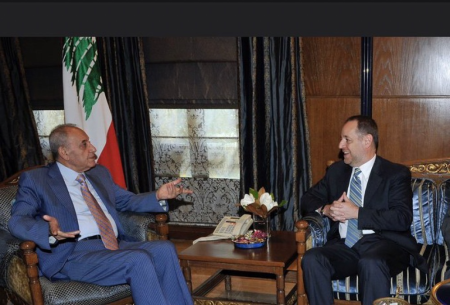The ex-minister and al-Mawarid Bank executive is indicted for multiple charges linked to the European assets of Riad Salamé, Governor of Lebanon’s Central Bank.

Marwan Kheireddine, former Lebanese minister and head of the private bank al-Mawarid, was indicted in Paris in late March as part of a French judicial investigation into the European assets of Riad Salamé, Governor of the Central Bank of Lebanon, according to an Agence France-Presse (AFP) report citing a source close to the case.
Kheireddine, 55, faces charges of criminal conspiracy, particularly with the intent to embezzle public funds by a public agent to the detriment of the Lebanese state, aggravated breach of trust, active and passive corruption of a public agent, and money laundering in an organized group. The former minister, who held office in the early 2010s, was already questioned by European investigators in Lebanon in January before being placed under judicial supervision.

Salamé, 72, is suspected of having been the beneficiary of al-Mawarid Bank accounts that were not properly monitored in exchange for various benefits for Kheireddine’s institution. The lawyer for Kheireddine did not immediately respond to a request for comment.
Several European and Lebanese investigations target Salamé for his extensive real estate and banking assets in Europe, which were subject to significant seizures in March 2022 due to suspicions of having been acquired through a massive embezzlement of Lebanese public funds. While not implicated at this stage in the French investigation, Salamé is summoned for questioning on May 16th in France, according to a Lebanese judicial source and the source close to the case.

According to the Lebanese source, Lebanon cannot force the governor to travel to France, and he is still subject to a travel ban imposed by Judge Ghada Aoun. However, Aoun could lift the ban to allow him to leave the country. Salamé’s lawyer, Pierre-Olivier Sur, said they are “examining the feasibility” of such questioning, as the procedure is, in his opinion, irregular.
Salamé, who was heard in mid-March in Beirut by several European judges investigating him, including French judge Aude Buresi, has proclaimed his innocence.
The indictment, the second in the French judicial inquiry opened in July 2021, is an “important step,” said William Bourdon, a lawyer contacted by AFP. According to him, it highlights that “the money laundering operations of the Salamé clan were only possible with the help of bankers in France and elsewhere.” Bourdon represents the Sherpa association and the Collective of Victims of Fraudulent and Criminal Practices in Lebanon (CPVCL), both civil parties in the case.
Salamé’s case has garnered international attention as it sheds light on the ongoing financial crisis in Lebanon, which has been exacerbated by political corruption and mismanagement. The investigations into the governor’s European assets are seen as part of a broader effort to hold high-ranking officials accountable for their role in the country’s economic collapse.
The indictment of Kheireddine, a prominent figure in Lebanon’s financial sector, further highlights the potential involvement of key players in the alleged money laundering operations. His connection to Salamé and the central bank raises questions about the integrity of Lebanon’s banking system and the extent to which corruption has penetrated the financial sector.
As the French investigation continues, authorities are expected to scrutinize other financial institutions and individuals with ties to Salamé and the Lebanese central bank. The outcome of these inquiries could have significant implications for the country’s efforts to rebuild its economy and restore international confidence in its financial system.
The Lebanese government has been under immense pressure from the international community to implement much-needed reforms to address corruption and stabilize its economy. However, progress has been slow, and the country continues to face an ongoing currency crisis, skyrocketing inflation, and widespread poverty.
The French-led investigation into Salamé and Kheireddine’s alleged misconduct demonstrates the growing international concern over Lebanon’s financial crisis and the urgency of addressing corruption at the highest levels. The case is a stark reminder of the challenges that lie ahead for the country as it seeks to recover from its worst economic crisis in decades.
In the meantime, as the legal proceedings against Kheireddine and Salamé unfold, the people of Lebanon anxiously await the outcomes, hoping for a sense of justice and accountability that could pave the way for a more transparent and stable financial future.